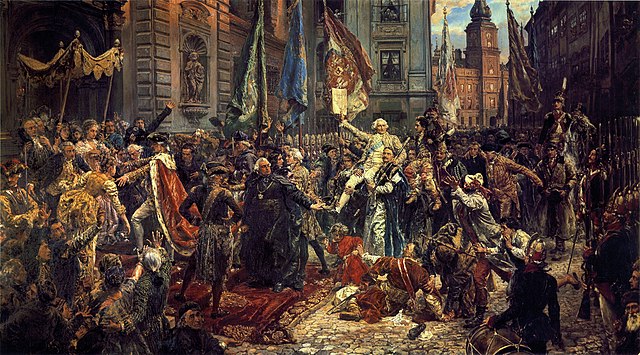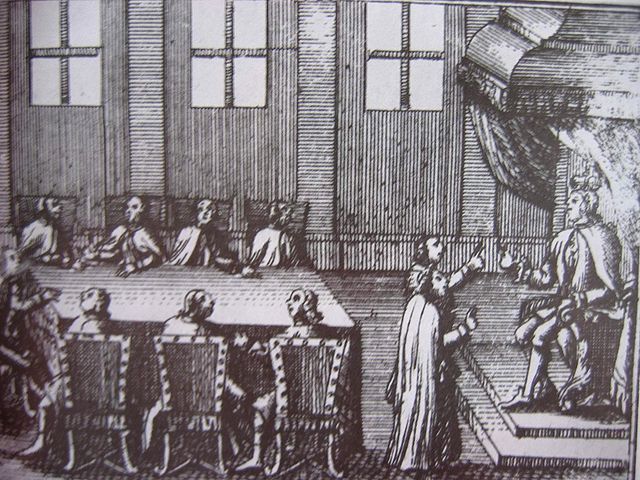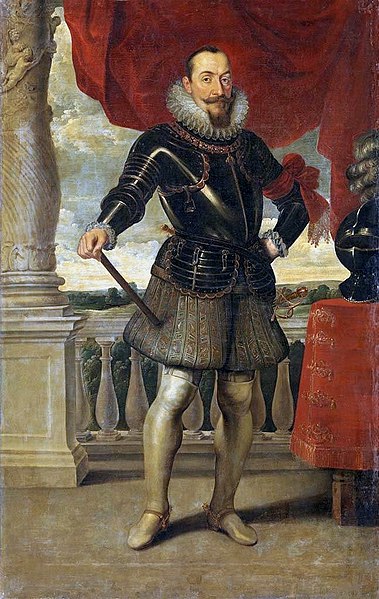Constitution of 3 May 1791
The Constitution of 3 May 1791, titled the Government Act, was a written constitution for the Polish–Lithuanian Commonwealth adopted by the Great Sejm that met between 1788 and 1792. The Commonwealth was a dual monarchy comprising the Crown of the Kingdom of Poland and the Grand Duchy of Lithuania; the new constitution was intended to address political issues following a period of political agitation and gradual reform that began with the Convocation Sejm of 1764 and the election that year of Stanisław August Poniatowski, the Commonwealth's last king. It is the third written constitution in history, after that of the United States and San Marino.
Constitution of 3 May 1791, by Matejko. Foreground: King Stanisław August (left) enters St John's Cathedral, in Warsaw, where deputies will swear to uphold the Constitution. Background: the Royal Castle, where the Constitution has just been adopted.
King Stanisław August Poniatowski, principal author of the Constitution of 3 May 1791. A year later, he acquiesced in its demise; this was seen by Constitution defenders as high treason, per the Constitution's Article VII and section six (sexto) of Article VIII, and per the Declaration of the Assembled Estates, of 5 May 1791.
In September 1773, Tadeusz Rejtan (on floor, lower right) tries to prevent ratification of the First Partition of the Polish–Lithuanian Commonwealth by barring other Sejm deputies from entering the Sejm chamber. Painting Rejtan, by Matejko.
From his election, King Stanisław August Poniatowski worked to develop an executive government council. In 1775 the Partition Sejm established a Permanent Council, after Russia's Catherine the Great concluded it would serve her purposes.
Polish–Lithuanian Commonwealth
The Polish–Lithuanian Commonwealth, formally known as the Kingdom of Poland and the Grand Duchy of Lithuania, or simply Poland–Lithuania, was a bi-confederal state, sometimes called a federation, of Poland and Lithuania ruled by a common monarch in real union, who was both King of Poland and Grand Duke of Lithuania. It was one of the largest and most populous countries of 16th- to 17th-century Europe. At its largest territorial extent, in the early 17th century, the Commonwealth covered almost 1,000,000 km2 (400,000 sq mi) and as of 1618 sustained a multi-ethnic population of almost 12 million. Polish and Latin were the two co-official languages, and Roman Catholicism served as the state religion.
The Union of Lublin joined the Kingdom of Poland and the Grand Duchy of Lithuania in 1569.
Sigismund III Vasa, who reigned between 1587 and 1632, presided over an era of prosperity and territorial expansion of the Commonwealth.
Sejm (parliament) of the Polish–Lithuanian Commonwealth in the early 17th century
John III Sobieski, victor over the Ottoman Turks at the Battle of Vienna in 1683.








